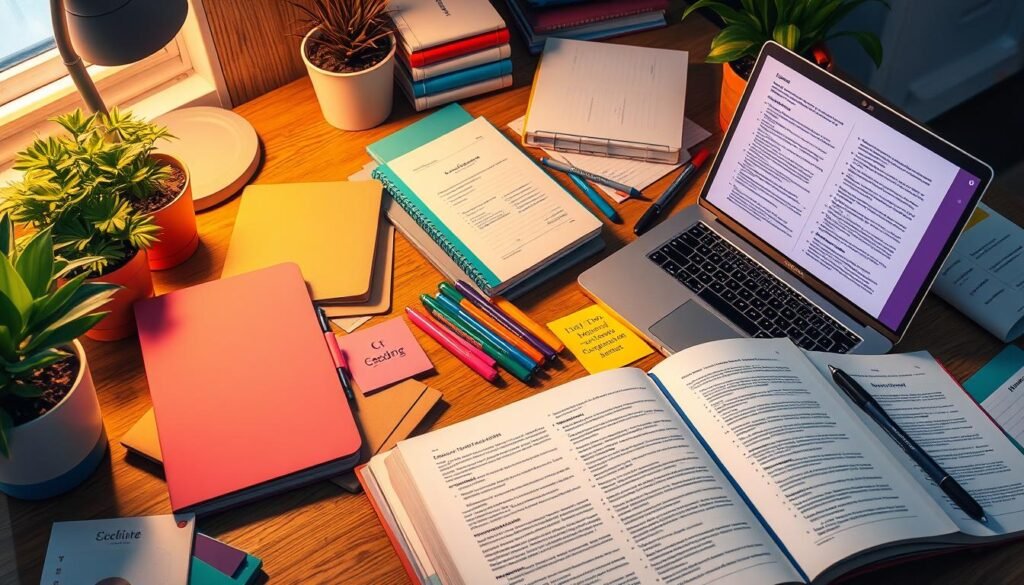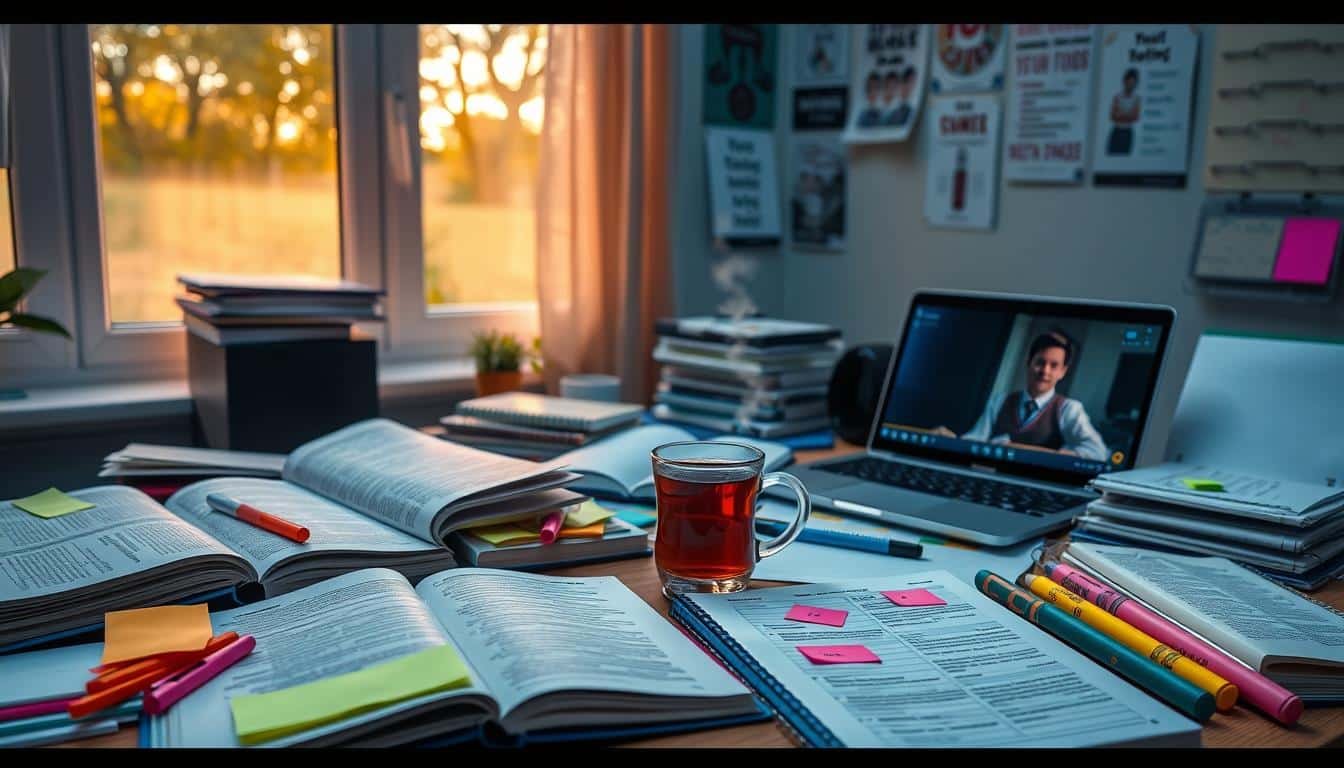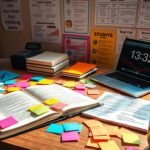To get top grades, you need a solid plan for Exam Success Strategies, smart study techniques, and a positive academic performance mindset. Good study habits and avoiding cramming help you understand the material well. This sets you up for success.
Get your study materials ready the night before and arrive early to the exam. Keeping a confident and positive attitude also helps a lot. These steps can lead to your best performance.
Also Read: Effective Exam Anxiety Solutions For Stress Free Tests
When you’re taking the exam, listen carefully to the instructions. Then, quickly look over the whole test. Start with the questions you find easiest.
Before you turn in your test, double-check your answers. This small step can give you a big boost in your grade. Using these strategies can really help you get the grades you want.
Key Takeaways
- Develop good study habits and avoid last-minute cramming for better exam preparation
- Arrive early to the test location and maintain a confident, positive attitude
- Pay close attention to test instructions and answer easy questions first
- Double-check answers before submitting the test to ensure maximum accuracy
- Incorporate a range of proven strategies to achieve top grades in exams
Understanding Different Learning Styles for Better Exam Preparation
Learning and doing well on exams isn’t the same for everyone. Knowing your learning style can help you reach your academic goals. Look into different learning ways and find methods that fit you best.
Also Read: Best Exam Scoring Techniques For Guaranteed Success
Visual Learning Techniques
Visual learners love using pictures, diagrams, and charts. They get information better when it’s shown in pictures. Using bright colors and flashcards can really help them.
Auditory Study Methods
Auditory learners learn best by listening and talking. They like recorded lectures and study groups. Talking about what they’ve learned helps them remember it.
Kinesthetic Learning Approaches
Kinesthetic learners do well with hands-on activities. They learn by doing and moving. Using blocks or models helps them understand complex ideas.
Knowing your learning style and using the right study methods can make a big difference. Try out different ways to see what works best for you. This will help you do your best on exams.
Also Read: Quick Exam Hacks To Boost Your Score Instantly
“The secret of education lies in respecting the pupil.” – Ralph Waldo Emerson
Effective Time Management and Study Planning

Getting ready for exams needs a smart plan for time and study. It’s key to make a study schedule that fits your learning style and goals.
First, figure out what’s most important and set SMART goals. Use digital calendars like Google Calendar to keep track of time. Also, use physical planners to plan for the long term.
It’s important to organize your daily tasks and priorities. Use apps like Asana to manage your work. Bullet journals or Evernote can help you stay organized anywhere.
Also Read: Best Personal Injury Claim Tips For Maximum Compensation
| Time Management Tool | Purpose |
|---|---|
| Google Calendar | Digital calendar for organizing schedules and events |
| Papier | Physical planner for long-term planning and goal setting |
| Asana | Project management app for task tracking and prioritization |
| Bullet Journals | Customizable notebooks for task management and organization |
Remember to take breaks and keep a balance between work and life. The Eisenhower Matrix helps you sort tasks by urgency and importance. SMART goals help you set realistic study goals.
Good time management means being accountable and asking for help when you need it. Study with friends or use your school’s resources to stay focused.
By using these tips, you can manage your time better, reduce stress, and do well on exams. This will help you succeed in school.
Exam Success Strategies That Top Students Use

Getting top grades in exams needs a mix of strategies. Successful students don’t just memorize. They use smart ways to study, learn together, and use tech for better learning.
Also Read: Essential Tenant Rights Information Every Renter Should Know
Creating Effective Study Materials
High-achieving students make complex info simple and easy to use. They make detailed flashcards and organize class notes well. This helps them review and remember key info for exams.
Group Study Benefits
Top students also learn by working together. Study groups help them understand subjects better. They share ideas and improve their critical thinking and problem-solving skills.
Using Technology for Better Learning
The digital world changes how we study. Students use tech like apps and online resources to prepare for exams. Techniques like the Pomodoro method help them stay focused and productive.
By using these methods, top students show a complete approach to studying for exams. They know success is more than just memorizing. It’s about understanding deeply and developing important skills for school and work.
“Effective study habits are the foundation of exam success. Top students invest time and effort into creating personalized study materials and leveraging collaborative learning and educational technology to maximize their performance.”
Maximizing Classroom Performance and Note-Taking

Doing well in school is more than just showing up to class. Good note-taking skills are key to doing well and staying engaged. They play a big role in your academic success.
To do well in class, you need to be active. Pay attention, ask questions, and take detailed notes. Studies show that writing down notes by hand helps you learn and remember better than typing (Mueller & Oppenheimer, 2014).
There’s no one right way to take notes. Different note-taking methods work for different people. Some like the Cornell method, while others prefer mind mapping. Try out different ways, like using symbols and colors, to find what works best for you.
It’s important to go over your notes soon after class. Doing this helps you remember and understand the material better. Also, using office hours to ask questions and get to know your teachers can help a lot.
| Note-Taking Method | Description | Best For |
|---|---|---|
| Linear Notes | Sequential organization of information | Lectures and events in order |
| Mind Mapping | Visual connections between ideas | Brainstorming and visual learners |
| Cornell Method | Detailed review and exam preparation | Comprehensive note-taking and studying |
By using these note-taking strategies and being active in class, you can reach your full potential. This will lead to great academic success.
Also Read: Best Study Tips For Final Exams – Ultimate Guide
Physical and Mental Preparation for Exam Day
As the exam day gets closer, taking care of your body and mind is key. Getting enough sleep, eating right, and managing stress are all important. They help you remember things and stay focused during the test.
Sleep and Rest Requirements
Try to sleep 7-9 hours the night before the exam. Good sleep helps your brain process information better. Don’t stay up late studying, as it can make you tired and less sharp.
Nutrition for Peak Performance
Eat a balanced breakfast with carbs and protein before the exam. This keeps your energy up and helps you stay alert. Drink water often and avoid too much caffeine, which can make you jittery.
Stress Management Techniques
Use stress management methods in your study routine. Try deep breathing or meditation to calm down. Imagine yourself doing well on the exam and stay positive. Short breaks while studying can also help you stay sharp.
FAQs
Q: What are the best strategies for exam success during final exams?
A: The best strategies for exam success during final exams include creating a study schedule, using active learning techniques, and managing your time effectively. It’s important to simulate exam conditions during practice sessions to prepare adequately for the real exam.
Q: How can I create a study schedule that works for me?
A: To create a study schedule that works for you, allocate specific study time for each subject, prioritize topics based on difficulty, and include breaks for self-care. Make sure your schedule is manageable and allows for flexibility as needed.
Q: What are some active learning techniques I can use to prepare for exams?
A: Active learning techniques include teaching the material to someone else, practicing with quizzes, and discussing complex concepts with peers. These methods help reinforce your understanding and retention of the material.
Q: How do I manage my time effectively while studying for finals?
A: Effective time management involves setting specific goals for each study session, breaking study material into smaller chunks, and using techniques like the Pomodoro Technique to maintain focus. Regularly review and adjust your study schedule based on your progress.
Q: What are some tips to help reduce stress before the final exam?
A: To reduce stress before the final exam, practice relaxation techniques such as deep breathing or meditation, ensure you get adequate rest, and maintain a balanced diet. Additionally, avoid cramming and give yourself enough time to prepare.
Q: How can I exam with confidence on the day of the test?
A: To exam with confidence, make sure you are well-prepared by studying thoroughly and simulating exam conditions during your preparation. Arrive early, review your notes lightly, and remind yourself of your hard work and readiness.
Q: What should I know about the exam format to prepare effectively?
A: Knowing the exam format is crucial for effective preparation. Understand whether the exam will consist of multiple-choice questions, essays, or problem-solving tasks. Tailor your study strategies and practice sessions to align with the specific exam format.
Q: What are strategic exam preparation techniques I can implement?
A: Strategic exam preparation techniques include setting clear objectives for each study session, using a variety of study resources, and regularly reviewing material. Engaging in group study and utilizing professor’s office hours for clarification can also be beneficial.
Q: How can I ensure I’m teaching the material to someone else effectively?
A: To effectively teach the material to someone else, break down complex concepts into simpler parts, encourage questions, and use examples that relate to real-life situations. This not only reinforces your own understanding but also helps the learner grasp the material better.
Source Links
- https://summer.harvard.edu/blog/14-tips-for-test-taking-success/
- https://thirdspacelearning.com/us/blog/test-taking-strategies/
- https://mblexguide.com/how-to-leverage-your-learning-style-for-more-effective-studying/
- https://flexcollegeprep.com/study-tips-for-different-learning-styles/
- https://summer.harvard.edu/blog/8-time-management-tips-for-students/
- https://online.marquette.edu/business/blog/effective-time-management-for-students-and-professionals
- https://www.student.com/articles/exam-success-strategies-a-guide
- https://blog.worldcampus.psu.edu/exam-success-strategies-tips-for-testing-with-confidence/
- https://www.listening.com/blog/note-taking-methods-strategies
- https://learningcenter.unc.edu/tips-and-tools/effective-note-taking-in-class/
- https://www.cuesta.edu/student/resources/ssc/study_guides/mathematics/211_math_steps.html
- https://dev.learningfundamentals.com.au/top-10-tips-for-taking-exams/
- https://www.aboms.org/news/managing-stress-while-studying-and-taking-board-certification-exams





